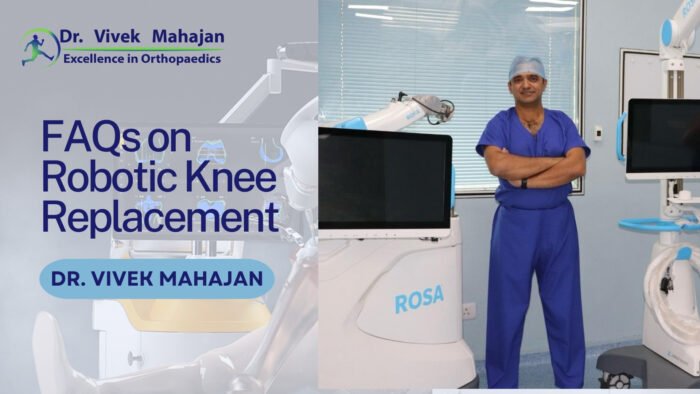In robotic knee replacement surgery, the process mirrors that of traditional knee replacement, involving removing damaged tissue and implanting an artificial joint. The key deviation lies in the integrating of a robotic arm, which assists the surgeon, enhancing precision and accuracy throughout the procedure.
FAQs on Robotic Knee Replacement Surgery:
Q-1 How does robotic knee replacement differ from traditional knee replacement?
Ans- In traditional knee replacement surgery, the surgeon uses manual instruments to remove damaged tissue and implant the prosthetic joint. In robotic knee replacement, a robotic arm, guided by Dr. Vivek Mahajan, provides real-time feedback to the surgeon, allowing for more precise bone cuts and alignment of the implant.
Q-2 Who is a candidate for surgery?
Ans- Candidates for robotic knee replacement are typically individuals with severe knee pain and disability due to conditions such as osteoarthritis, rheumatoid arthritis, or post-traumatic arthritis. Dr. Vivek Mahajan will evaluate your specific situation to determine if robotic knee replacement is appropriate for you.
Also Read: Blog on Robotic Knee Replacement
Q-3 How long does robotic knee replacement surgery take?
Ans- The duration of surgery varies depending on the complexity of the case and other factors. On average, the procedure typically takes between one to two hours with the skillful guidance of Dr.Vivek Mahajan.
Q-4 Does insurance cover robotic knee replacement surgery?
Ans- Coverage for robotic knee replacement surgery varies depending on your insurance provider and policy. It’s essential to check with your insurance company beforehand to understand your coverage and any potential out-of-pocket expenses, and Dr. Vivek Mahajan’s team can assist with this process.
Q-5 How soon can I expect to return to normal activities?
Ans- The timeline for returning to normal activities will vary depending on individual factors such as the extent of surgery and your overall health. Dr. Vivek Mahajan will guide you on gradually increasing your activity level while ensuring proper healing and safety.
Q-6 Will I still need physical therapy after robotic knee replacement?
Ans- Yes, physical therapy is an essential part of the recovery process after robotic knee replacement. Under Dr. Vivek Mahajan’s guidance, a physical therapist will work with you to improve strength, range of motion, and mobility in your knee.
Q-7 Are there any risks or complications associated with surgery?
Ans- As with any surgical procedure, there are potential risks and complications associated with robotic knee replacement, including infection, blood clots, implant loosening, and nerve or blood vessel injury. Dr. Vivek Mahajan will discuss these risks with you before surgery.
Q-8 What ongoing care will I need after surgery with Dr. Vivek Mahajan?
Ans- Dr. Vivek Mahajan and his team will schedule follow-up appointments to monitor your progress, assess your knee function, and address any concerns that may arise. They will guide long-term care, including activity modifications and measures to maintain the health and longevity of your knee implant.
Q-9 What is the recovery process like after robotic knee replacement?
Ans- Recovery after robotic knee replacement involves a combination of physical therapy, pain management, and gradual return to activities. Under Dr. Vivek Mahajan’s guidance, most patients can expect to be discharged from the hospital within a few days and resume light activities within a few weeks.
Q-10 How can I schedule a consultation with Dr. Vivek Mahajan to discuss robotic knee replacement surgery?
Ans- To schedule a consultation with Dr. Vivek Mahajan, you can contact his office directly or visit his website for more information. His staff will assist you in setting up an appointment and guiding you through the pre-operative process.


Very informative blog on Robotic Knee Replacement Surgery.